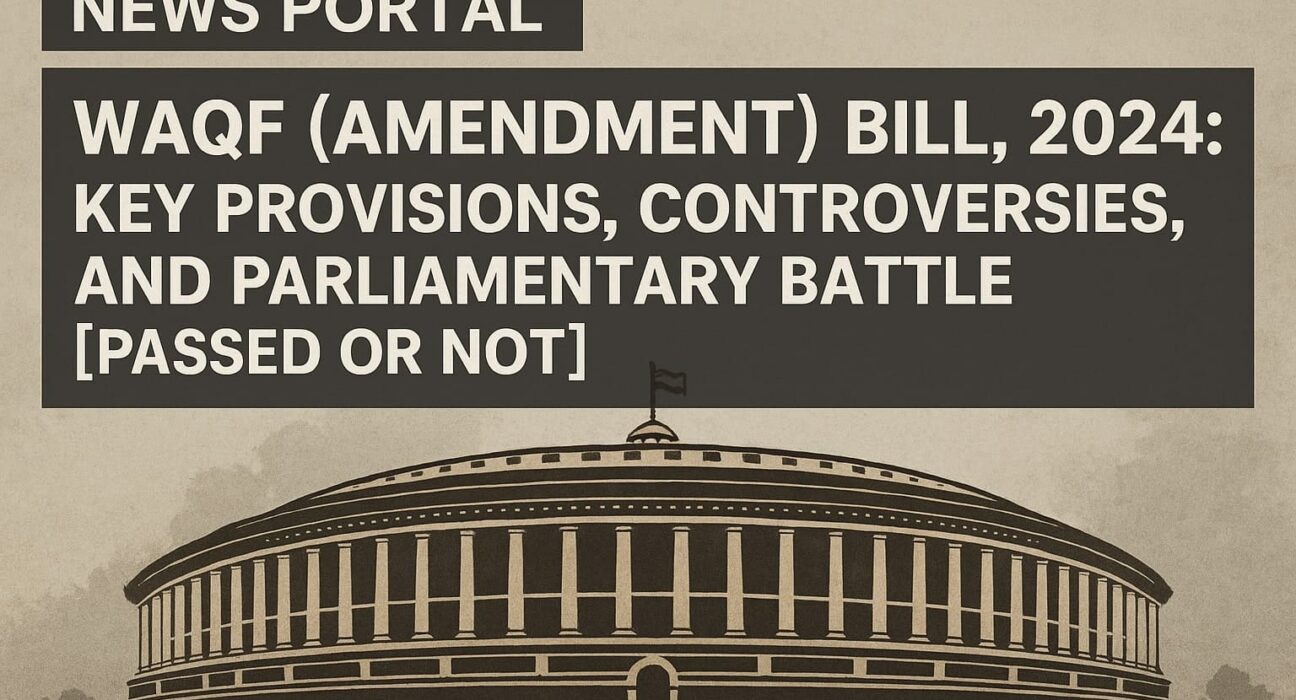The Waqf (Amendment) Bill, 2024 has stirred up intense debate in the Indian Parliament and across the nation. Tabled by Union Parliamentary Affairs Minister Kiren Rijiju, the Bill proposes over 40 amendments to the existing Waqf Act of 1995, prompting opposition from several political parties. It aims to overhaul the administration, regulation, and governance of waqf properties across India. As discussions heat up in the Lok Sabha, the Bill has become a focal point of religious, legal, and political discourse.
Highlights of Waqf Amendment Bill [Passed or Not]
• Introduced by: Union Minister Kiren Rijiju
• Introduced in: Lok Sabha, August 2024
• Key Aim: Amend the Waqf Act, 1995 to enhance waqf property regulation and inclusivity
• Total Amendments Proposed: 40
• Debate Duration in Lok Sabha: Scheduled for 8 hours (extendable)
• Status: Pending approval (as of last update)
What is Waqf and Why is it Important?
Waqf refers to a permanent dedication of property for religious or charitable purposes under Islamic law. In India, Waqf Boards manage around 8.7 lakh properties across 9.4 lakh acres, making waqf the third-largest landholder in the country—after the Armed Forces and Indian Railways.
Key Features of the Waqf (Amendment) Bill, 2024
• Renaming the Act: To be called the Unified Waqf Management, Empowerment, Efficiency, and Development Act, 1995
• Inclusion of Non-Muslims: Central and State Waqf Boards to include non-Muslim and Muslim women members
• Survey Authority Shift: Powers transferred from the Survey Commissioner to the District Collector
• Government Property Clause: Any government land identified as waqf will no longer be treated as waqf
• Appeal Mechanism: Removes finality of Waqf Tribunal decisions; allows direct appeal to High Courts
• Registration and Audits: Empowers Centre to frame rules for waqf registration, audits, and publication of financial records
• Control Over Disputes: The Collector now decides on the ownership of disputed waqf properties
Why the Opposition is Strongly Against the Bill
The Bill has drawn criticism from major Opposition parties, who call it “unconstitutional”, “divisive”, and a direct attempt to dilute Muslim representation in waqf governance.
• Religious Representation Concerns: Critics argue that including non-Muslim members on Waqf Boards goes against the religious character of the waqf institution
• Lack of Judicial Expertise: The removal of experts in Muslim law from Tribunals could affect fair adjudication
• Collector’s Overreach: Granting Collectors authority over waqf property determination may undermine the autonomy of Waqf Boards
• Minimum Five-Year Islamic Practice Rule: A clause requiring individuals to be practicing Muslims for at least five years before creating a waqf has been called arbitrary and exclusionary
• No Consideration for Opposition Views: Opposition MPs claim their recommendations to the Joint Parliamentary Committee were ignored, alleging a “bulldozing” by the BJP
Political Fallout and Reactions
• Congress, NCP, and AAP leaders, including Rahul Gandhi, Mallikarjun Kharge, and Sanjay Singh, convened a strategy meeting to oppose the Bill.
• Congress MP Khaleequr Rahman called the process a “constitutional violation”.
• MP Kiran Kumar Chamala stated that any move to “de-establish” a particular community will be met with strong resistance.
The BJP and Congress have issued whips to ensure all their MPs are present during the vote.
What Happens Next?
As of now, the Bill is under discussion in the Lok Sabha, with a scheduled 8-hour debate. Whether it will pass or be sent to a review committee remains uncertain. If passed in the Lok Sabha, it will proceed to the Rajya Sabha for further approval.
Till now, watch Live Discussion on The Waqf (Amendment) Bill, 2025 & The Mussalman Wakf (Repeal) Bill, 2024 in Lok Sabha on Sansad TV official YouTube Channel (The Parliamentary channel of India). The Bill further amends the Waqf Act, 1995, and the Bill to repeals the Mussalman Wakf Act, 1923.
Conclusion
The Waqf (Amendment) Bill, 2024, marks one of the most significant proposed overhauls of waqf property management in India. While the government views it as a step toward efficiency and transparency, critics see it as an attempt to weaken community-based religious governance. As the Bill navigates parliamentary scrutiny, the coming days will determine its fate—and possibly set a precedent for religious property laws in India.
FAQs
Q: What is the main purpose of the Waqf (Amendment) Bill, 2024?
The Bill aims to improve the administration, transparency, and inclusivity of Waqf Boards and properties.
Q: Why is there controversy over the Bill?
The inclusion of non-Muslim members and enhanced powers to government authorities have raised concerns over religious autonomy and constitutional propriety.
Q: Has the Bill been passed yet?
As of now, the Bill is under debate in the Lok Sabha and has not been passed.
Q: Who introduced the Waqf (Amendment) Bill?
It was introduced by Union Parliamentary Affairs Minister Kiren Rijiju.
Q: What happens if the Bill is passed in the Lok Sabha?
It will move to the Rajya Sabha for further approval before becoming law.
Sources & References
• Lok Sabha Bulletins & Agenda (2024)
• Ministry of Minority Affairs Press Releases
• ANI News Agency Reports
• Interviews with Opposition Leaders and MPs
• The Waqf Act, 1995 (Original & Proposed Amendments)

